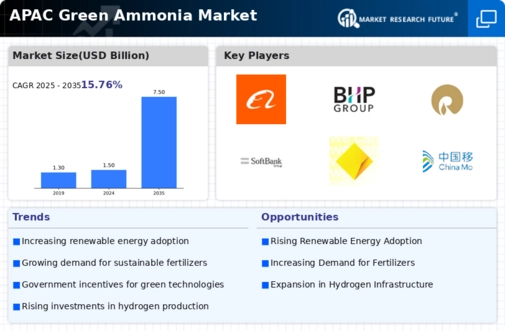China : China's Dominance in Green Ammonia
Key markets include major industrial hubs like Shanghai, Beijing, and Guangdong. The competitive landscape features significant players such as Yara International and China National Chemical Corporation, which are investing heavily in green ammonia technologies. Local dynamics are characterized by a strong push towards sustainable practices in agriculture and energy sectors. The fertilizer industry is a primary application area, with increasing adoption of green ammonia in agricultural practices to reduce carbon footprints.
India : India's Growth in Sustainable Solutions
Key markets include states like Gujarat, Maharashtra, and Tamil Nadu, where industrial activities are concentrated. The competitive landscape features players like Hindalco Industries and JGC Holdings Corporation, which are actively pursuing green ammonia projects. The business environment is becoming increasingly favorable due to supportive policies and investments in renewable energy. The agricultural sector is a significant application area, with green ammonia being utilized as a sustainable fertilizer alternative.
Japan : Japan's Technological Advancements
Key markets include Tokyo, Osaka, and Aichi Prefecture, where industrial activities are concentrated. Major players like Nippon Fertilizer and JGC Holdings Corporation are leading the charge in green ammonia production. The competitive landscape is characterized by a focus on high-tech solutions and partnerships with international firms. The energy sector is a primary application area, with green ammonia being explored as a fuel for power generation and transportation.
South Korea : South Korea's Energy Transition Focus
Key markets include Seoul, Busan, and Incheon, where industrial activities are concentrated. Major players like Korea Gas Corporation and Siemens AG are investing in green ammonia projects. The competitive landscape is marked by collaborations between public and private sectors to enhance production capabilities. The shipping and transportation sectors are significant application areas, with green ammonia being explored as a clean fuel alternative.
Malaysia : Malaysia's Sustainable Energy Initiatives
Key markets include Selangor, Penang, and Johor, where industrial activities are concentrated. The competitive landscape features local players and international firms like KBR, Inc. that are exploring green ammonia production. The business environment is becoming increasingly favorable due to supportive policies and investments in infrastructure. The agricultural sector is a primary application area, with green ammonia being utilized as a sustainable fertilizer alternative.
Thailand : Thailand's Renewable Energy Focus
Key markets include Bangkok, Chonburi, and Rayong, where industrial activities are concentrated. The competitive landscape features local players and international firms that are exploring green ammonia production. The business environment is becoming increasingly favorable due to supportive policies and investments in infrastructure. The agricultural sector is a primary application area, with green ammonia being utilized as a sustainable fertilizer alternative.
Indonesia : Indonesia's Renewable Energy Potential
Key markets include Jakarta, West Java, and East Java, where industrial activities are concentrated. The competitive landscape features local players and international firms that are exploring green ammonia production. The business environment is becoming increasingly favorable due to supportive policies and investments in infrastructure. The agricultural sector is a primary application area, with green ammonia being utilized as a sustainable fertilizer alternative.
Rest of APAC : Emerging Markets in APAC
Key markets include emerging economies in Southeast Asia and the Pacific Islands. The competitive landscape is characterized by a mix of local and international players exploring green ammonia production. The business environment is evolving, with increasing investments in infrastructure and technology. The agricultural sector is a significant application area, with green ammonia being utilized as a sustainable fertilizer alternative.


















